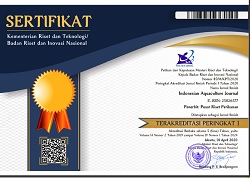ORGANIC ENRICHMENT OF SEDIMENTS: A CASE STUDY AT MARICULTURE SITE, PEGAMETAN BAY BALI, INDONESIA
Abstract
Mariculture industry has been developed progressively in Indonesia, where its impact on the surrounding aquatic environment is inevitable. The particulate wastes produced such as excess food and feces will be discharged from a marine farm and dispersed into the surrounding areas. This process could lead to organic enrichment of the receiving seabed sediment and gradually degrade water quality and disturb local benthic community as well as the aquatic ecosystem of the area. This study focused on determining the level of organic enrichment of sediment underneath four currently-active farms in Pegametan Bay, North Bali, Indonesia. The results showed that high accumulation of organic matters was evident in all sampling farms indicated by a significantly high particulate organic matter (POM) between 75.20 ± 2.57 and 92.97 ± 0.59%, and low redox values between -217.41 ± 2.74 and -343.57 ± 1.48 mV. A visual-based assessment also determined that the sediment had a silt and muddy texture with deep grey to black colorization with noticeable strong H2S odor. In this case, further investigations and monitoring efforts are needed in the near future to ensure the best management programs for sustainable farming and ecosystem both fish farmers and environmental regulators such as local government.
Keywords
Full Text:
PDFDOI: http://dx.doi.org/10.15578/iaj.14.2.2019.55-62

Indonesian Aquaculture Journal is licensed under a Creative Commons Attribution-ShareAlike 4.0 International License.
















_25.jpg)


